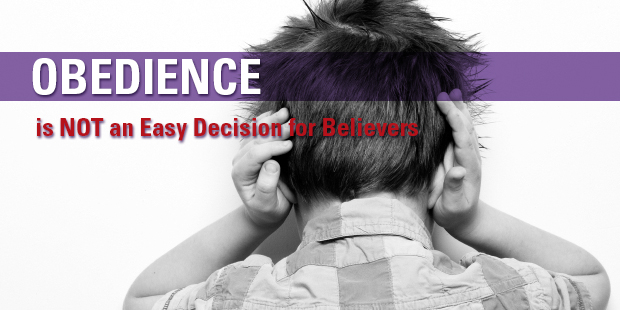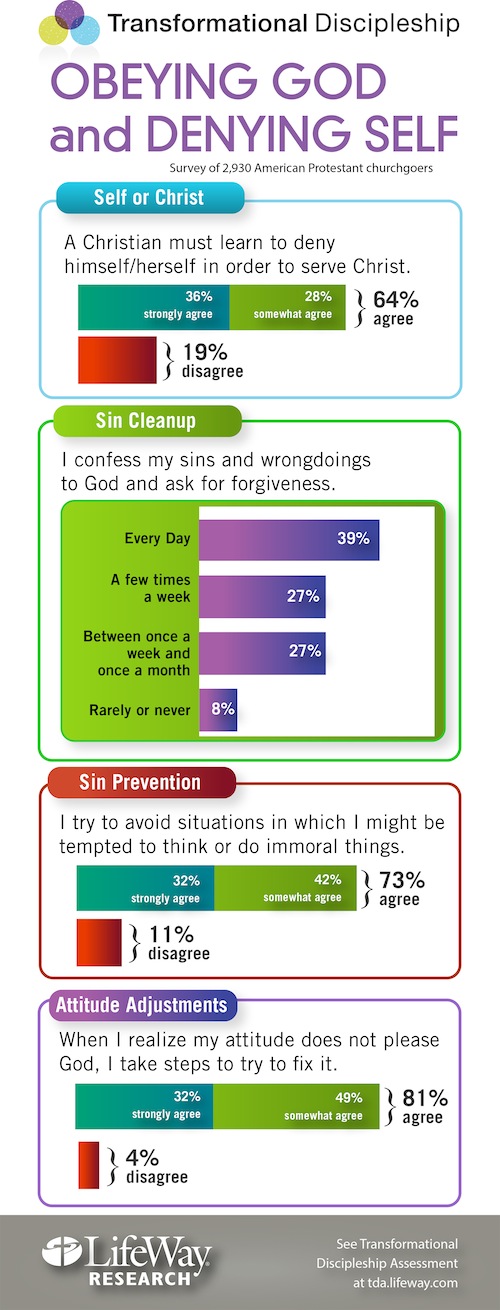
Obedience is Not an Easy Decision for Believers
Throughout 2012, we have been releasing groundbreaking new research from LifeWay Research’s Transformational Discipleship study. In the study, we were able to identify eight attributes which consistently show up in the lives of believers who are progressing in spiritual maturity.
The latest data released focuses on the need to make personal, sacrificial decisions in order to better obey Christ, or as we have titled it “Obeying God and Denying Self”. The study found that less than one-third of churchgoers strongly agree they are following through in specific aspects of obedience.
The survey reveals 64 percent of churchgoers agree with the statement: “A Christian must learn to deny himself/herself in order to serve Christ.” Nineteen percent disagree with the statement.
The survey measures confession of sins and asking God for forgiveness as one component of ‘Obeying God and Denying Self.’ When asked how often, if at all, they personally “confess…sins and wrongdoings to God and ask for forgiveness,” 39 percent indicate every day and 27 percent say at least a few times a week. Eight percent of respondents say they rarely or never confess sins and wrongdoings to God and ask forgiveness.
Sin was not only addressed after the fact – the survey also asked individual churchgoers how proactive they are in avoiding sin with the statement: “I try to avoid situations in which I might be tempted to think or do immoral things.” Three-fourths agree with the statement, but only 32 percent strongly agree. Ten percent disagree, and 16 percent responded indifferently.
The survey also examines an individual’s inclination to adjust their attitude through the statement: “When I realize my attitude does not please God, I take steps to try to fix it.” More than 80 percent agree with the statement, but only 32 percent strongly agree. Fifteen percent neither agree nor disagree, and four percent disagree.
Actions that can positively impact the scores of individuals on the Obeying God and Denying Self attribute were identified as:
- Attending a worship service;
- Making a decision to obey or follow God with an awareness that choosing His way may in some way be costly;
- Being discipled or mentored one-on-one by a more spiritually mature Christian;
- Reading the Bible or a book about what is in the Bible;
- Praying for the spiritual status of unbelieving acquaintances;
- Setting aside time for prayer of any kind.
Obeying God and Denying Self is also the only one of the eight attributes of discipleship that was predicted by more frequent worship attendance.
These findings on obeying God and denying self are part of the largest discipleship study of its kind. Results from each of the eight attributes of spiritual maturity will continue to be released over the coming months.
To help pastors, churches and individuals measure spiritual development, LifeWay Research used the study’s data to develop a questionnaire for believers, called the Transformational Discipleship Assessment (TDA). This online evaluation delivers both individual and group reports on spiritual maturity using the eight factors of biblical discipleship. The TDA also provides helpful and practical suggestions on appropriate next steps for spiritual development.

Tags: Ed Stetzer, Spiritual Maturity, Transformational Discipleship, Transformational Discipleship Assesment













